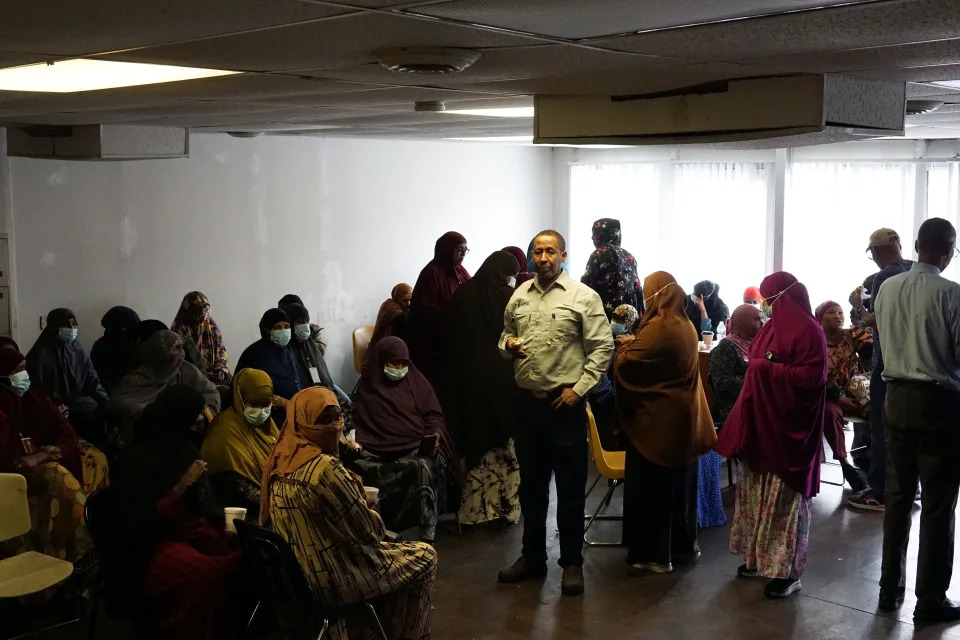Peter Gill, Columbus Dispatch

Over 60 workers walked off the job Friday morning at a Macy’s Backstage distribution center in Greater Columbus to protest a new prayer policy they say amounts to religious discrimination.
Muslim workers on the 12-hour shift that starts 6 a.m. told The Dispatch they walked out because of a change in policy that requires them to use their half-hour lunch break time for prayer. Previously, they were given time to pray three times per shift without using up their break time.
“It means either you eat (or) you pray, so this is hard for us,” said Fartun Mohamed, one of the protesting workers.
“We feel disrespected,” said Zamzam Ali, another worker who walked out Friday from the distribution center at 7145 Rickenbacker Parkway West, on Columbus’ Far South Side.
A total of 67 Muslim workers joined the protest, according to Halima Abdi, a case manager at the Somali Community Association of Ohio, which hosted a meeting for the workers Friday morning after the walkout. Most of the protesting workers are women, and many come from the Somali community, along with other East and West African groups. Their distribution center is not unionized, they said.
Macy’s Backstage is a brand of Macy’s Inc., which is based in New York and sells products in central Ohio online and through outlets in Dublin, Polaris and Easton.
“At Macy’s, we stand for diversity, equity and inclusion in all our workplace facilities,” a spokesperson told The Dispatch in a prepared statement. “Recently, at Macy’s Columbus, Ohio Distribution Center, we updated the religious accommodations process to both accommodate our praying colleagues and ensure that all colleagues in the facility are treated equitably.”
The spokesperson added that workers may “use their paid and unpaid breaks, and they may request additional unpaid break time to the extent they need more time for prayer. In addition, Macy’s works with colleagues to rearrange their break time as necessary to meet their religious needs.”
For Muslims, praying five times a day is a religious duty and a central part of Islamic belief.
Under federal law, employers with more than 15 employees must provide reasonable accommodations for workers to adhere to religious practices unless doing so would result in undue hardship.
“The ‘undue hardship’ part is where it gets tricky,” said Amina Burhami, executive director of the Council on American Islamic Relations Ohio. “Employers that use best practices … are generally good about having conversations and having an interactive process with employees to ensure that … (workplaces) not only allow for accommodations, but also ultimately bring a benefit to the employer as well … (because) employees want to come to work every single day.”
Farhia Abdalle, one of the protesting workers, said she began working at the Macy’s Backstage distribution center four years ago. Until Friday, the management allowed Muslims to pray three times per shift — typically five to seven minutes per prayer in a dedicated prayer room — without deducting break time, she said.
In September, managers announced a new prayer policy would begin in October but did not listen to workers’ feedback opposing it, Mohamed said.
“They didn’t give us a chance to (negotiate). They were just like, this is the new policy we have, you have to follow,” she said.
“It bothers us because it’s like they’re not respecting our religion,” said Mustafa Hassan, another worker.

Workers told The Dispatch they also objected to other management practices at the Macy’s Backstage distribution center. For example, the management recently installed a camera in their prayer room without the knowledge of employees, Mohamed said.
“I’m a Muslim — there’s a reason I keep my head covered. I if I knew that there’s a camera I wouldn’t have uncovered my head,” she said, adding that she complained to human resources at the time.
The Macy’s spokesperson did not dispute that a camera was installed in the prayer room but said that surveillance signage is “prominently posted throughout the facility.”
Hassan Omar, the director of the Somali Community Association of Ohio, said that disputes over prayer were frequent when Muslims began working in Greater Columbus’ warehouses decades ago but became less common over the years.
“Whenever (Somalis) have a problem with…employment discrimination — any issues — I try to speak with the managers, I try to speak with human resources,” he said.
State Rep. Ismail Mohamed, D-Columbus, and Kawther Musa, another Somali community leader, both expressed concerned about prayer accommodations at Macy’s and said they plan to meet with the Ohio Civil Rights Commission next week.
“Making sure that these individuals have the right to pray freely and that they are accommodated reasonably, that they’re treated with respect, is so essential,” Rep. Mohamed said.
Immigrants and refugees from various parts of the globe are a major source of labor for warehouses, distribution centers and manufacturing in Central Ohio.
Macy’s Inc. is a $3 billion corporation, but it has lost roughly half its market capitalization since January, in part because of a slowdown in consumer spending.
Source: Columbus Dispatch

Leave a Reply